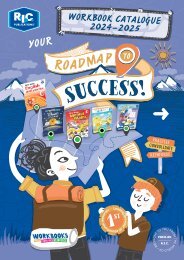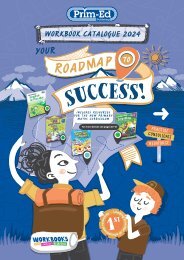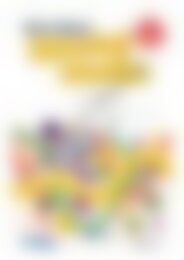PR-2288IRE My Spelling Workbook Teacher Guide - Book B
You also want an ePaper? Increase the reach of your titles
YUMPU automatically turns print PDFs into web optimized ePapers that Google loves.
Metacognitive Approach<br />
Aim: To encourage children to become successful independent spellers and thinkers.<br />
Introductory Stage<br />
• Each category of question (Clarifying, Literal, Inferential, Personal, Visualising, Predictive, Summarising and Reflective)<br />
should be explained to the children. It is important that they understand what kind of question they are asking.<br />
• Not all cards will be relevant in every situation. On occasion, they will be.<br />
• Some of the questions may appear to be the same but are repeated under different categories. This is because the context is<br />
different and this should be explained to the children.<br />
Preparation Stage<br />
• The teacher chooses a suitable spelling word. A word that encompasses all the categories of questions is better. However, it<br />
should be stressed that not all categories are relevant to every word; for example, ‘yesterday’.<br />
• The cards are displayed for all children to see. <strong>Teacher</strong>s might prefer to enlarge the cards to A3 when photocopying or to<br />
laminate them. (See pages 6–13).<br />
Modelling Stage<br />
• The teacher models a word; for example, ‘yesterday’. The teacher demonstrates the thinking process involved by applying the<br />
questions suggested in the relevant categories and ‘talking’ through his or her answers.<br />
• Allowing children to interact with the teacher using this process can be very productive.<br />
Explanation of Question Types<br />
Clarifying questions are questions that make words,<br />
phrases or concepts clear and understandable.<br />
For example: What is the word?<br />
forgot<br />
What does this word mean?<br />
didn’t remember<br />
Can the word be broken into smaller sounds?<br />
for—got<br />
Literal questions are questions that have a straightforward answer found in the text.<br />
For example: What is the tricky part of the word?<br />
or<br />
Inferential questions are questions that ask you to deduce answers from the text.<br />
For example: Can I think of some other way to help remember how to spell this word?<br />
break the word into two little words: for, got<br />
Review sample<br />
Personal questions are questions that are relevant to oneself.<br />
For example: Do I know how to spell any part of this word?<br />
yes<br />
Is this a word that I need to learn to spell?<br />
yes, because I sometimes use this word in my writing<br />
4 <strong>My</strong> <strong>Spelling</strong> <strong>Workbook</strong> B <strong>Teacher</strong>s <strong>Guide</strong>—Prim-Ed Publishing—www.prim-ed.com

















